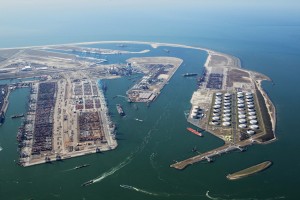Archives
Business, Freight News, Sea
Container transfers between different Maasvlakte terminals Rotterdam soon to become easier
[ June 28, 2016 // Gary G Burrows ]In the near future, you will no longer require a physical Customs document to transfer containers from one Maasvlakte terminal to the other. The participating terminals (APMT, ECT and RWG) have made agreements to this end with the Dutch Tax and Customs Administration. This so-called ‘paperless transfer’ system considerably reduces the administrative workload – particularly for shipping lines. The initiative simplifies the exchange of containers between terminals.
Rotterdam’s Maasvlakte has five deep-sea container terminals. Containers that arrive at the one terminal regularly need to be shipped on via a different terminal. This concerns many tens of thousands of containers every year. And this total will only increase further in the years ahead, as a result of shifts in the alliances formed by the shipping companies, among other things.
European customs legislation recently started offering the option of transferring containers from one terminal to the other – under specific conditions – without further paperwork. The Association of Rotterdam Shipbrokers and Agents (VRC), the participating container terminals of ECT, APMT and RWG, the Dutch Tax and Customs Administration and the Port of Rotterdam Authority have made agreements that are intended to take advantage of this new legislation and facilitate paperless transfers at the Maasvlakte area.
“These agreements allow the shipping companies to exchange containers between the different container terminals at Maasvlakte without a mass of paperwork,” says VRC Chairman Kees Groeneveld. “It’s an important step that allows us to keep costs low for companies active in Rotterdam – particularly in light of the strong competition faced in the Hamburg-Le Havre range.”
As of July 1, 2016, all five deep-sea terminals will be ready to implement the system. In addition, the concept may in time be rolled out to other container terminals in the port of Rotterdam.
The companies will start with the paperless transfer of transshipment containers. In due time, the parties also expect to be able to expand this procedure to the bundling of rail and inland shipping volumes.
“The paperless transfer of containers between the different Maasvlakte terminals is important for Rotterdam’s position as a port,” says Rob Bagchus, Chairman of the Rotterdam Terminal Operators’ Association (VRTO). “That’s why the terminals have worked to realise this system as quickly as possible.”
“Paperless transfers simplify the transport of containers from one terminal to the other and improve Rotterdam’s competitive position,” adds Allard Castelein, CEO, Port of Rotterdam Authority.
The next step will be the construction of the Container Exchange Route, which allows for the transport of containers between terminals via a closed system. According to Port of Rotterdam planning, this project will be rounded off within two years. The agreements presently entered into regarding paperless transfers will also apply to the Container Exchange Route.
Tags: Maasvlakte terminals Rotterdam









